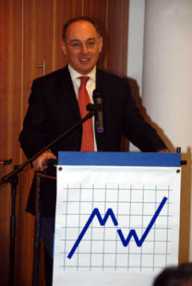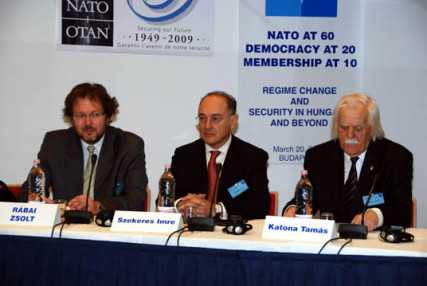“We Need A Stronger NATO”
Szöveg: László Szűcs | 2009. március 31. 6:27”NATO 60, change of the political system 20, NATO membership 10 – Change of the system and security in Hungary and beyond” was the title of the international conference held by the Manfred Wörner Foundation in a hotel in Buda on Friday. The opening speech of the conference was delivered by Minister of Defence Dr. Imre Szekeres.
Historian Tamás Katona, Chairman of Manfred Wörner Foundation said in his welcome speech that the conference is a very important assessment of the situation, because as regards the past decade and the years before that, there are things to look back to and of course, there are things to look ahead to.
– The NATO Hungary wanted to join was not the same NATO it had eventually joined in 1999. And the NATO that there is today is not the same NATO Hungary joined in 1999. And what today’s conference is about is the next NATO – Defence Minister Imre Szekeres started his speech. He also said that if our world had to be described in a single word, then this word would be change. In this process NATO – due to its power and means – has a key role as regards the preservation and extension of security. It is especially true in the current global financial–economic crisis that has led to a considerable decay in the sense of security as a collateral effect.

– I am convinced that NATO can be a key factor in responding to the challenges of today’s world, therefore we have to utilize the opportunities of the Alliance. But because of that, NATO itself has to change as well, since this is the only way it can react to the impacts of the changing world. In the past years, NATO was able to make this change and constantly adapt to new security challenges, new tasks, and problems – said Imre Szekeres.
The defence minister added: the new way of thinking of the Obama administration, and the return of France to NATO’s integrated military structure may facilitate the transformation of the Alliance, since this will create an opportunity for strengthening the transatlantic relationships.
In the opinion of Minister Imre Szekeres, the past sixty years of NATO could be described only in terms of a success story, since the organization is perhaps the most stable political-military alliance in history. Its power lies in common values, solidarity, and commitment to democracy. In the past years the key to success was that the North Atlantic Alliance was flexible enough both in the political and the military sense to adapt to the changes at all times. After the cold war for example, it had expanded the zone of stability and security as a result of the enlargement process, and at the same time established an extensive partnership network. Its military capabilities have also been transformed, therefore NATO has remained to be the world’s strongest alliance.
– Why is there a need to strengthen NATO any futher? – asked the minister. – Because the Alliance does not simply guarantee the security of the European and North American region, but is also the cornerstone of global security. For the Alliance has the means and possibilities with the help of which steps can be taken for global security. A stonger NATO means that an even stronger military structure has to be established.
Minister Szekeres underlined: NATO’s strategic concept, which was adopted ten years ago, needs to be reviewed. For many things have changed in the past decade, similarly to the nature of threats. Responses have to be adapted to meet new types of challenge, while we must also respond to the security challenges posed by old-type threats. This is why there is a need for the new strategic document. The defence minister underlined: in his opinion, after the anniversary summit to be held next month in Strasbourg-Kiehl the elaboration of the new strategic concept has to begin as soon as possible, and it can be completed in 1-1.5 years.
Minister Szekeres said: the new strategic concept has to reinforce the central role of collective defence, and provide the right answers to new security challenges. In other words, it has to reflect on the issues of energy security, climate change, and cyber security. The new concept also has to identify the directions and means of capacity development, and the efficient methods for the utilization of resources.
– This will be a new NATO, in which not only the military capabilities will be renewed but the so-called ‘non-military’ capabilities as well. This new NATO has to change its structure and way of operation alike. It has to be more organized and efficient – said Imre Szekeres, adding: it also has to be decided what the cooperation between NATO and the European Union would look like, and how we can make cooperation far more efficient than it is today. For it is absurd that these two organizations have only one joint operation, which is the EU Althea mission in Bosnia and Herzegovina. Therefore it is essential to transform this relationship. As regards the future of Kosovo, a step towards cooperation may be the timetable of how the European Union will take over NATO’s present role.
Minister Imre Szekeres also mentioned NATO’s greatest challenge at the moment that is contribution to the consolidation in Afghanistan, which – in his opinion – is the duty of the whole international community and not only the Alliance. But military presence is not enough, further important tasks also include participation in the development of Afghan administration and economy, that operate with acceptable efficiency.

– I am convinced that in Afghanistan there is a need for the development of a country which can function under the given local circumstances, instead of developing a western-style state and establishment. No state can be ’violated’, in other words the cultural-social background and historic development of a state cannot be disregarded. The new NATO strategy has to rely on these foundations – said the minister, adding: in Afghanistan an Afghan solution is needed. In the country, the Afghan government and the Afghan people can do the most for consolidation, and it is the duty of the international community to support these efforts in the most efficient way. What we have to work on is the development of an Afghan state which corresponds to the local social and political environment and is capable of providing basic governmental functions, organizing and maintaining its own security. In line with this, administration can be established and organized regionally, in accordance with local social and political characteristics, with regard to the tribal and ethnic foundations as well.
The defence minister emphasized: 2009 can be a real turning point in this process, since after the August 20 elections, the administration will hopefully be more productive and trust in the whole government will grow. Moreover, the consolidation of the situation in Afghanistan entails an important message as well. The success of the mission can prove it to the world that NATO is capable of strengthening global security.
Although for NATO the top political and military priority at the moment is Afghanistan, the stability of the Balkans will always be a key issue for Europe and the transatlantic region, said Minister Szekeres, who also stressed that it is a strategic aim that in due course, every state in the Balkans – Serbia included, of course – should join the organizations of the Euro–Atlantic integration. Since only full integration can guarantee long-term stability in the region.
– In the Balkans, the presence of NATO has to be maintained for the time being. The extent and nature of future presence has to be outlined in close cooperation with the European Union. In Bosnia, the handover between the two organizations was successful. Similarly to that, in the case of Kosovo we have to act tactfully as regards any transformation because the security situation is still fragile and the ultimate provider of security is still the NATO – underlined the defence minister.
Imre Szekeres continued his presentation with Russia. Like he said: in order to strengthen global security, the cooperation with Russia has to be continued because due to its geographical area, political-military power, and weight in economy, which is the result of its energy carrier stocks, the country is an important player not only in the security of Europe, but also in the security of the Central Asian and Middle Eastern regions. Moreover, we have to realize that the energy supply of Europe is still dependent on Russia in the first place, therefore continuous dialogue is essential in order to avoid a new conflict.
The defence minister stressed: he trusts that the colder period after the events in Georgia is over, and the time has come to find opportunities for cooperation in practice. The fact that the United States of America wants to install its missile defence system on European territory, and the serious tension it has caused also concern the reationship between NATO and Russia. In the opinion of Minister Szekeres, it would be acceptable for every party if NATO constructed its own missile defence system the elements of which would be deployed in Europe as well, but would operate under the supervision of the Alliance. This would serve the common interests of NATO and provide protection to the United States and European member states alike.
Before closing his speech, Imre Szekeres emphasized: in order to create a stronger NATO, it is important that the Alliance is strongly supported in member states. We Hungarians are successful as regards this issue, since on the basis of a survey carried out by an opinion poll company in March, 76 percent of the respondents believed that our membership in the North Atlantic Treaty Organization increases the security of Hungary. 58 percent reckoned that on the whole, our country benefits from NATO membership, while 33 percent said the membership has its benefits and disadvantages as well. In short, 91 percent of the respondents have a fundamentally positive opinion about our membership.
The international conference organized by Manfred Wörner Foundation continued with presentations on the foreign and security policy of system transformation. In the next panel, Hungarian and foreign presenters were talking about NATO, which is celebratig its 60th birthday this year. In the last block, the participants could listen to presentations on Hungary’s 10 years in the Alliance.